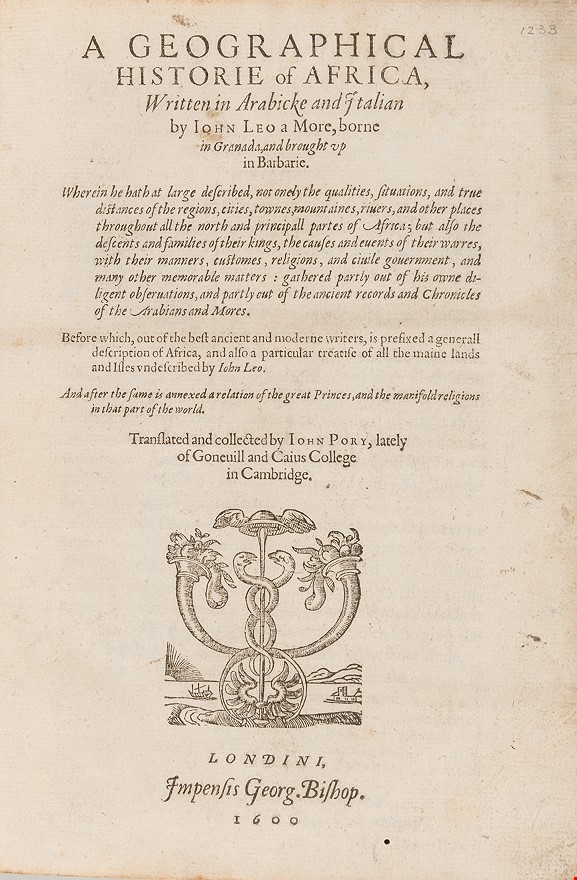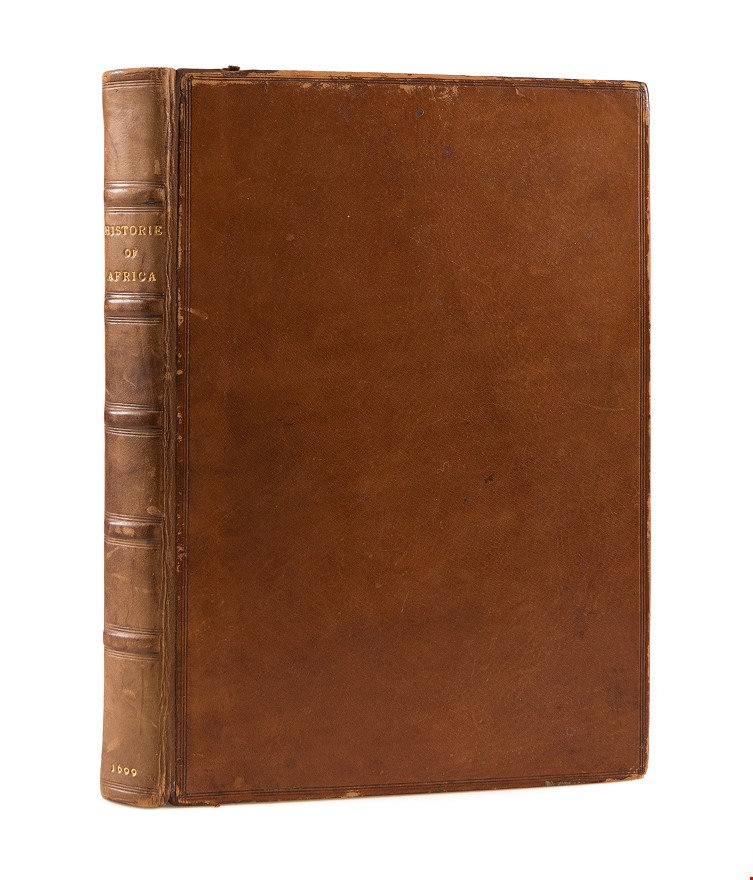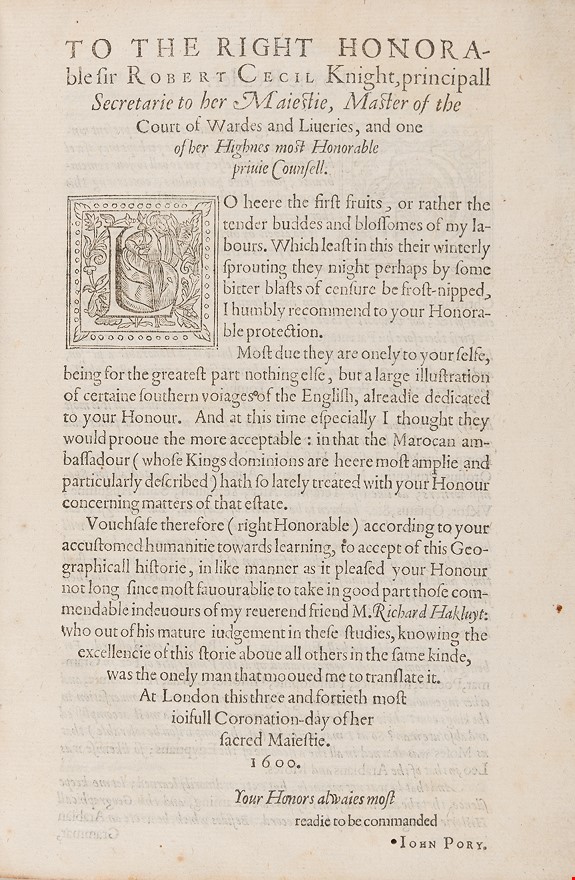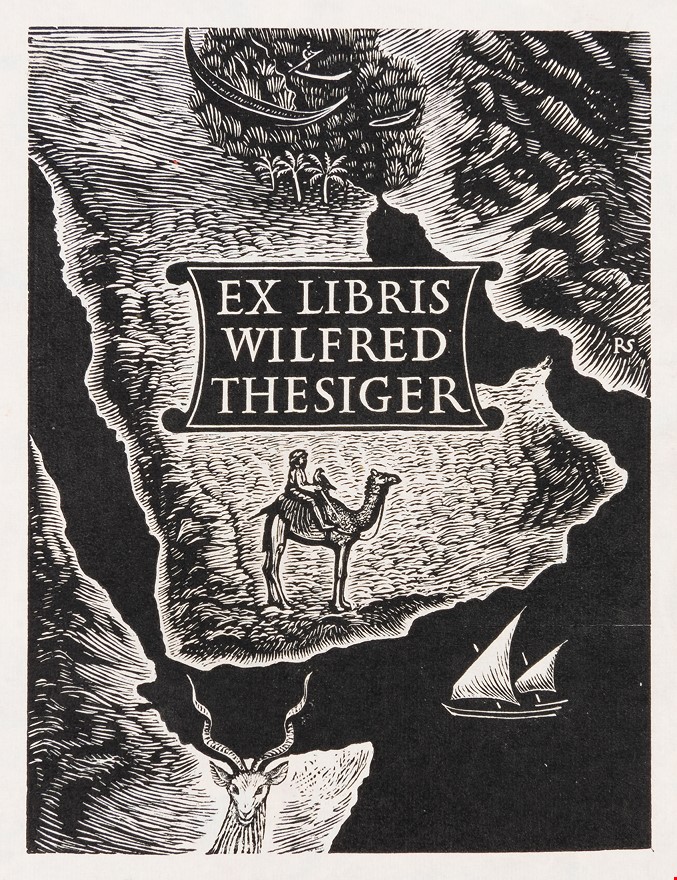A Geographical Historie of Africa,
LEO AFRICANUS (1600.)
£30000.00 [First Edition]
Please contact us in advance if you would like to view this book at our Curzon Street shop.
WILFRED THESIGER'S COPY: FIRST EDITION IN ENGLISH.
Written in Arabicke and Italian by Iohn Leo a More, borne in Granada, and brought up in Barbarie. Wherein he hath at large described, not onely the qualities, situations, and true distances of the regions, cities, townes, mountaines, rivers, and other places throughout all the north and principall partes of Africa; but also the descents and families of their kings, the causes and events of their warres, with their manners, customes, religions, and civile government, and many other memorable matters: gathered partly out of his own diligent observations, and partly out of the ancient records and Chronicles of the Arabians and Mores. Before which, out of the best ancient and moderne writers, is prefixed a generall description of Africa, and also a particular treatise of all the maine lands and Iles undescribed by Iohn Leo. ... Translated and collected by Iohn Pory, lately of Gonevill and Caius College in Cambridge.
First edition in English. Folding engraved map. Large 8vo. Nineteenth-century calf, rebacked. One small (defunct) wormhole running through all text pages and into the rear board, rest of interior clean and fresh. [8], 60, 420pp. London, [Eliot's Court Press] Imp. Georg. Bishop,
A lovely copy of one of the most significant early books on Africa. The first Italian edition (Venice, 1550) was the first European publication to provide detailed descriptions of the North African coast and parts of West-central Africa, including the then famously elusive city of Timbuktu. It is also an essential text on Islam in Africa, and one importantly written from an Islamic perspective (the author was born and undertook his travels as a Muslim). This copy has a distinguished provenance, having formerly belonged to Wilfred Thesiger (1910-2003), who was born in Addis Ababa, and whose decade-long exploration of the Empty Quarter (Rub’ al Khali) is recounted in his 1959 classic, Arabian Sands.
Leo Africanus (c.1485-c.1554), whose Arabic name was al-Hasan ibn Muhammad al-Wazzan al-Fasi, was born in Granada and educated at Fez. He travelled extensively in northern Africa before being captured by Christian pirates on his return from an ascent of the Nile to Aswan. The pirates, impressed with his intelligence, presented him as a gift to Pope Leo X who persuaded him to convert and stood sponsor at his baptism in 1520 when he took the name Giovanni Leone. He subsequently returned to Africa and died at Tunis. After leaving Cambridge the translator John Pory (1570?-1635) became an assistant to the travel writer Richard Hakluyt who encouraged him to produce this work which is dedicated to Sir Robert Cecil and contains 60 pages of additional material consisting of a general description of Africa and of places undescribed by Leo. He later became M.P. for Bridgwater (1605) and travelled extensively in Europe as far as Constantinople and visited Virginia in 1619-21 and 1623-24.
Originally published in 1550 by Ramusio in Italian, this text subsequently became the basis of all future translations. Pory's translation was a "major landmark in the spread of knowledge of Africa in England" (Eldred Jones), and the book remained a standard work of reference until the nineteenth century. It is credited by the OED with the first use of the words hippopotamus and zebra in the English language; and literary scholars engaged on the never-ending quest for Shakespearian source-books have suggested that it may have been one of the sources for Othello. Although the evidence is only circumstantial, it is entirely possible that Pory's description of the Moors as credulous, violent and jealous ("whomsoever they finde but talking with their wives they presently go about to murther them") may have influenced Shakespeare. Ben Jonson certainly knew the work, as he cites "Leo the African" in the notes to his Masque of Blackness (1605).
Provenance: armorial bookplate of the Hon. Charles Howard, the "Gift of Rt. Hon Sir David Dundas of Ochtertyre 1877", thence in the library of the Earls of Carlisle; cartographical Reynolds Stone bookplate Wilfred Thesiger.
See: Jones (Eldred), Othello's Countrymen: the African in English Renaissance Drama, 1965; Powell (W. S.), John Pory, 1572-1636: the life and letters of a man of many parts, 1977; STC, 15481.
Stock Code: 225784







